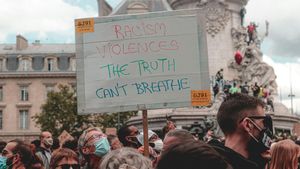The backdrop of this year's COP29 is the lively city of Baku, Azerbaijan, known for its rich history and stunning architecture. But this summit is no ordinary gathering; it marks the 29th Conference of the Parties to the UN Framework Convention on Climate Change, where leaders from nearly 200 countries have come together, albeit some notable absences loom large. Rather than representing decisive action, this event has sparked skepticism about its potential outcomes. It's set against the ticking clock of climate change and the urgent need for effective mitigation strategies.
Starting on November 11 and running until November 22, COP29 finds itself focused squarely on the sensitive question of finance: who pays the bill for the global energy transition? This year’s discussions are particularly charged, with climate experts warning the planet could warm by 2.5 to 2.9 degrees Celsius—nearly double the temperature limit established by the Paris Agreement. The stakes have never been higher.
One of the central themes of COP29 is the discussion of climate finance, which figures prominently on the agenda. Delegates are under pressure to set ambitious targets for funding interventions aimed at combating climate impacts. This encompasses the establishment of new financial mechanisms to support nations grappling with the consequences of climate change.
Leading figures, including Simon Stiell from the UN Framework Convention on Climate Change and UN Secretary-General António Guterres, have used their platforms to reinforce the idea of climate aid not being mere charity. Stiell emphasized, "Climate aid funding by rich countries is not charity and is in everyone’s interest." This sentiment was echoed by Guterres, who boldly stated, "Those who desperately try to delay and deny the inevitable end of the fossil fuel era are trying to turn clean energy...into a dirty word. They will lose. The economics are against them.”
Recent studies bolster these statements. A report from the Boston Consulting Group indicates if states fail to act, they could face economic losses of 10-15% of global GDP by the end of the century. Conversely, these impacts could potentially be mitigated with investments totaling less than 2% of GDP, effectively curbing global temperature rise.
Yet for all the pressing rhetoric, the negotiations are overshadowed by significant absences from the summit. Key leaders such as European Commission President Ursula von der Leyen, French President Emmanuel Macron, Brazil's Luiz Lula da Silva, and Chinese President Xi Jinping are all conspicuously missing, raising eyebrows and concerns. Their absence raises questions about the ambitions and commitments of developed nations when it matters most.
Paris Agreement success hinges on coordinated global efforts to curb emissions, yet rising polarizations complicate this objective. Just as the summit kicked off, headlines across global media pointed to the impending return of Donald Trump to U.S. presidential power after the recent elections. His administration is expected to withdraw the U.S. from the Paris Agreement on day one, which would represent another setback for international climate cooperation. The United States still stands as one of the largest producers of fossil fuels and one of the highest per capita CO2 emitters worldwide.
For many observers, the uncertainty surrounding U.S. participation casts doubt on the effectiveness of COP29. John Podesta, representing the current Biden administration, sought to instill hope, stating, “Even if the U.S. federal government under Donald Trump suspends action on climate, work to curb climate change will continue across the states with commitment, passion and faith.” Such reassurances may not be enough to calm critics.
Environmental activists and global climate advocates argue passionately for the need for urgent and coordinated action as the summit proceeds under considerable contradictions. How does one advocate for climate progress when the host nation is Azerbaijan—a country known for significant oil and gas production? Just like last year’s COP hosted by another major fossil fuel exporter, the stakes feel ineffably skewed, leading to accusations of hypocrisy.
Ahead of COP29, tensions escalated as several environmental activists were reportedly arrested during protests within Azerbaijan, underlining the oppressive underpinning of the local political environment. The co-head of the Greens' party, Terry Reintke, voiced concern and frustration over this dichotomy: “we are gathering to talk about climate change hosted by those who put critics behind bars.”
Additional scrutiny surrounds the relationship between Azerbaijan's energy reliance and European energy security. The country has become pivotal for the EU’s energy supply, especially with the recent geopolitical crises bifurcated by the war in Ukraine. The reliance creates complex dynamics, where the need for energy security may overshadow environmental commitments.
Adding more complexity to COP29 are the different national approaches to climate action. For the EU, ambitions are couched within the broader framework of the European Green Deal, which aims for carbon neutrality by 2050. Yet, the absence of high-profile leaders raises questions—will Europe be able to galvanize the necessary support to push through impactful climate finance measures, especially when major players remain on the sidelines?
The backdrop of geopolitical tensions complicates the already fractured climate narrative. Prominent world leaders focusing on national interests rather than global commitments signals potential chaos when the world needs coherence most. The unsteady climate negotiations are overshadowed by the realities of forthcoming elections and shifts within powerful countries, possibly derailing collective climate ambitions.
Corrosively, COP29 might set the stage for reaffirming the confidence gap between developed and developing economies. The question remains; as COP29 convenes, can realistic and actionable plans emerge without the presence and participation of major global leaders, or are we left with lofty promises unanchored by genuine follow-through? The urgency of the climate crisis awaits diligent action, yet the uncertainty of what lies beyond COP29 beckons with trepidation.



